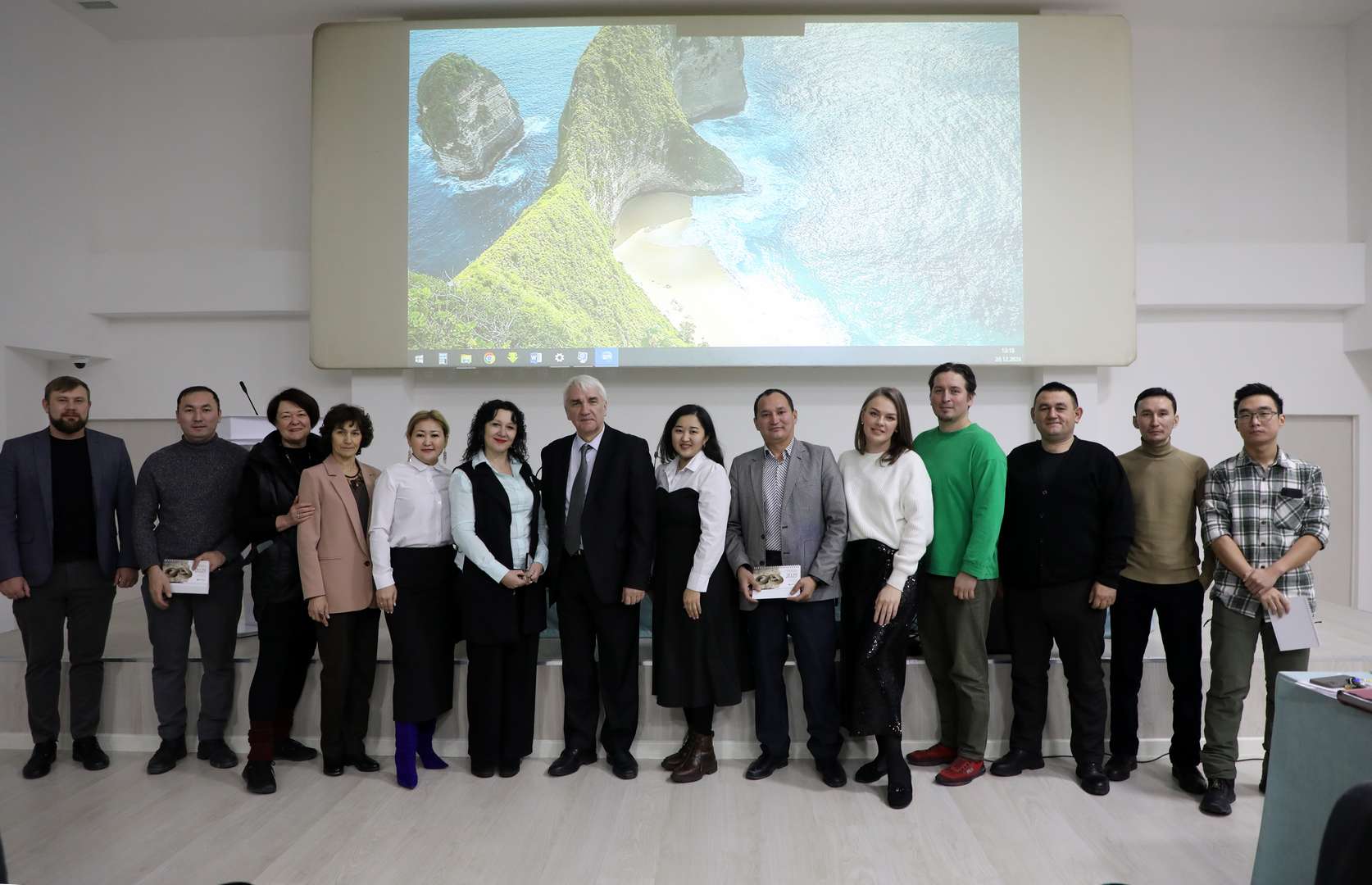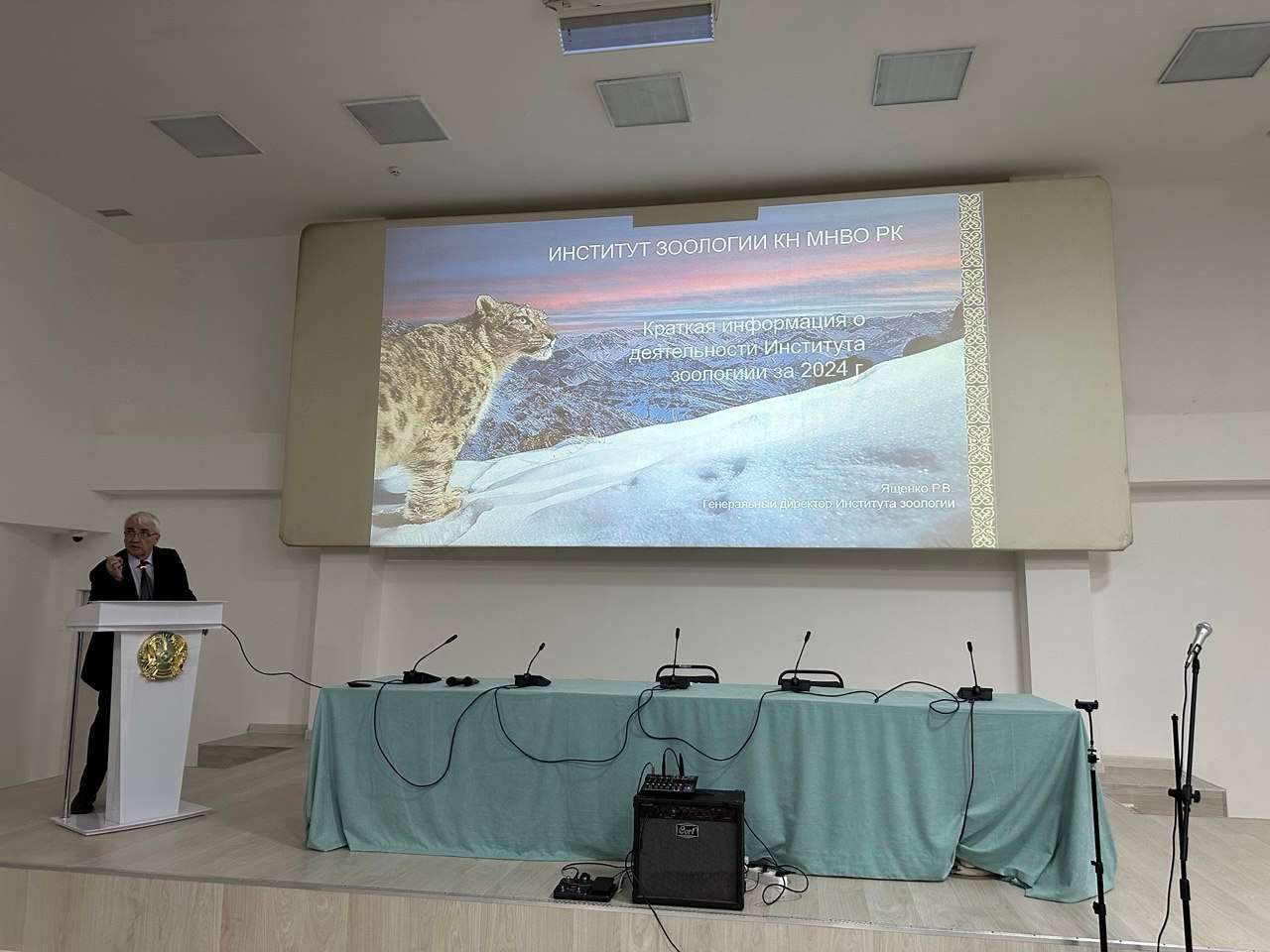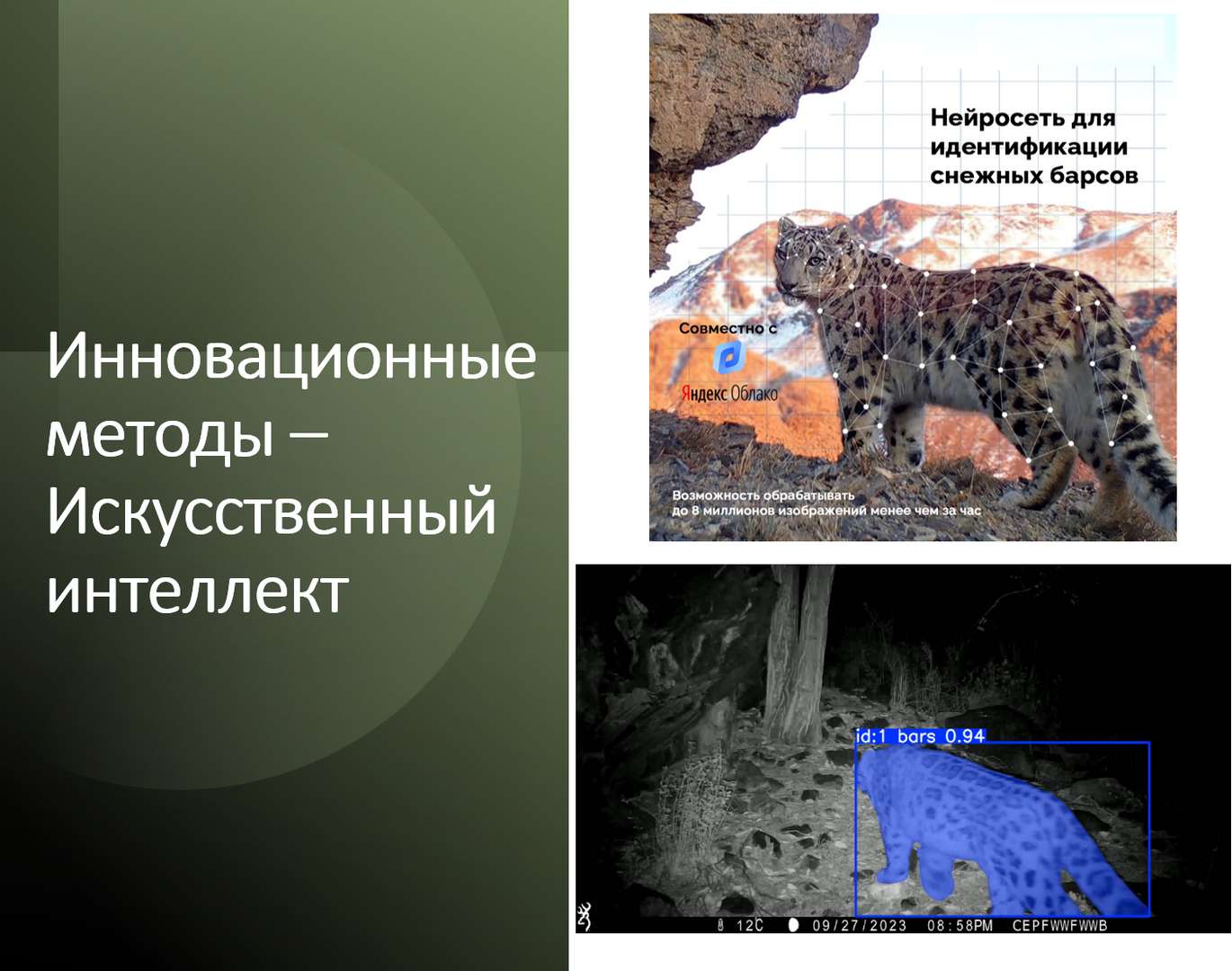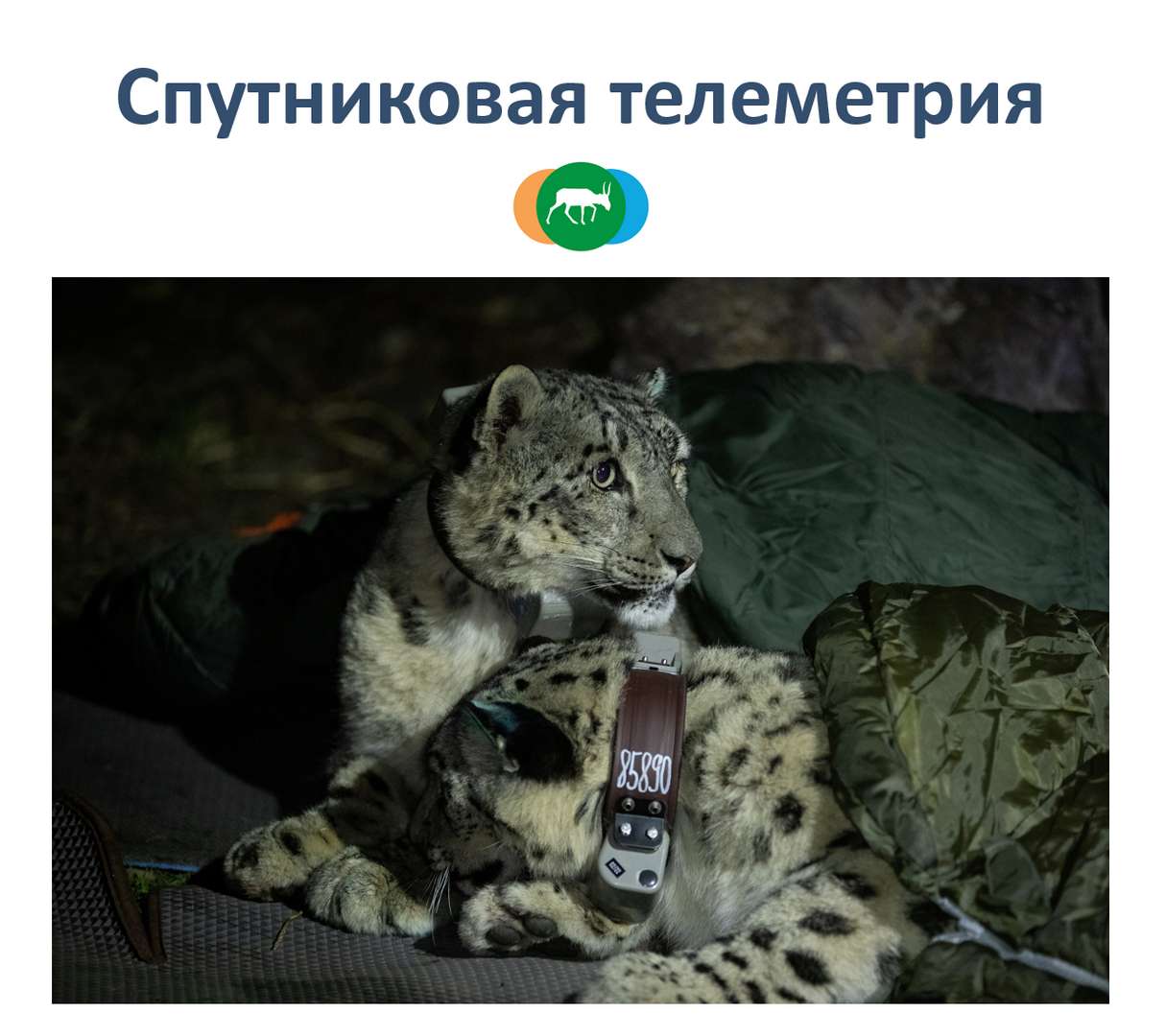The General Director, Doctor of Biological Sciences, Roman Jashenko, delivered a report on the institute’s activities. Heads of the scientific laboratories of hydrobiology and ecotoxicology; entomology; theriology; paleozoology; ornithology and herpetology; arachnology and other invertebrates; animal cryobank and germplasm; biocenology and game management, as well as the GIS and RS department, informed their colleagues about the main scientific achievements of their units over the past year.

Despite certain difficulties associated with the building’s major renovation, the institute successfully fulfilled all the tasks set for this year.
Which projects did the RK Institute of Zoology conduct research on in 2024?
FIVE targeted financing programs:
1. “Development of the Red Book of Animals of Kazakhstan and an electronic database of rare and endangered animals” IRN BR18574058 (2023–2024);
2. “Assessment of the state of biological resources in the Kazakhstani part of the Irtysh Basin under cross-border use of water resources and climate change” IRN BR18574062 (2023–2024);
3. “Cadastre of wild animals in the arid territories of the Balkhash-Alakol Basin with an assessment of threats to their conservation and sustainable use” IRN BR21882199 (2023–2025);
4. “Development of an information system for the cadastre of wild animals of the Western Tien Shan in order to ensure their conservation and sustainable use” IRN BR24993060 (2024–2026);
5. “Development of a system for the sustainable use of the Betpak-Dala and Ustyurt saiga populations” IRN BR23591114 (2024–2026).

FIVE scientific grants:
1. “Assessment of the impact of linear infrastructure construction on saiga populations and development of measures to reduce harm to animals and their ecosystems in Kazakhstan” IRN АР19680227 (2023–2025);
2. “Ecological and faunistic features of insects damaging wild populations of Sivers apple (Malus sieversii) in the Ile and Zhetysu Alatau” IRN AP14972741 (Жас галым) (2022–2024);
3. “Development of environmentally safe methods to combat arthropod pests of crop production in southeastern Kazakhstan” IRN AP15473734 (2022–2024);
4. “Freshwater mollusks of Kazakhstan: species composition, role in ecosystems, and the ways of fauna formation” IRN AP22783298 (Жас галым) (2024–2026);
5. “Study of the fundamental aspects of interspecies transfer of somatic cell nuclei of the snow leopard (Pantera uncia) for the preservation of biological diversity” IRN AP23488891 (2024–2026).
In 2024, zoological research was carried out on 17 contract-based topics.
As a result of the work, more than 90 scientific articles were published, including 27 articles in peer-reviewed journals indexed in the WoS and Scopus databases, and 23 articles in Kazakhstani journals recommended by Committee for Quality Assurance in Science and Higher Education .
9 patents and 2 certificates of implementation were obtained, 3 monographs, 3 books (including the Red Book of the Republic of Kazakhstan), one study guide, and an atlas were prepared.
Institute staff participated in the development of 11 legal and regulatory acts of the Republic of Kazakhstan related to the conservation and use of wildlife.
The Institute of Zoology closely cooperates with various Kazakhstani nature protection organizations and expands its international collaboration. Currently, memorandums and cooperation agreements have been signed with 31 international scientific and educational organizations from such countries as China, Russia, Japan, Mongolia, Germany, Switzerland, Norway, Italy, the Czech Republic, Bulgaria, Romania, Hungary, South Africa, Belarus, Kyrgyzstan, Uzbekistan, etc.
This year, the scientific and technical base has been supplemented with new equipment and instruments, allowing research at a high modern level.
Over the past year, the institute’s employees gave more than 70 interviews to various media outlets, held meetings with schoolchildren and students to popularize zoology, and participated in Kazakhstani and international scientific conferences, round tables, and scientific seminars.
At the Institute of Zoology, a Republican conference for schoolchildren, “Kazakhstan’s Fauna,” was held on research projects in zoology (jointly with the Palace of Schoolchildren), and the GBIF International Symposium: “Data on the Biodiversity of Eurasian Mountains and Deserts” took place.
These are the brief results of the work carried out by the Institute in 2024. It was a challenging but interesting and productive year. We hope that next year our results will be even higher, and the scientific recommendations and proposals will be implemented and bring noticeable results in terms of preserving the biodiversity of our country.
Let us preserve nature and the wildlife around us for our descendants together!
In addition to summarizing the scientific work for 2024, at the meeting Diplomas of successful completion of postdoctoral studies were awarded to two employees of the institute – Tanabekova Gulzhanat, the institute’s Academic Secretary, and Tursynkulov Askhat, Junior Researcher at the Laboratory of Arachnology and Other Invertebrates. The diplomas were awarded based on the decision of the Academic Council of the Institute of Zoology, dated “October 29” (Protocol №213) and the decision of the NNS from “December 16–18” 2024 (Protocol №29).
The institute staff was presented with the program of the “Basics of Programming in R” course, scheduled to begin in January 2025. The program is intended to improve the qualifications of the institute’s staff, and the training will be conducted by Ivan Frolov, a Researcher at the Laboratory of Ornithology.


